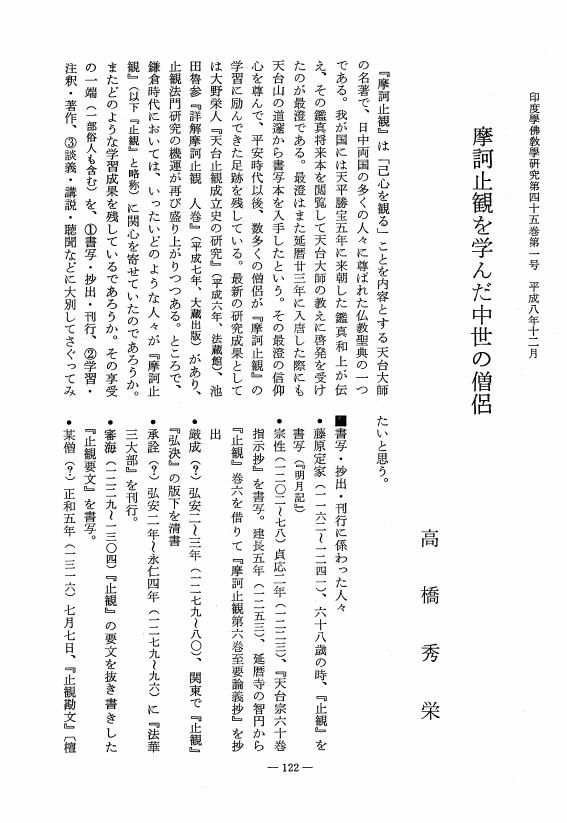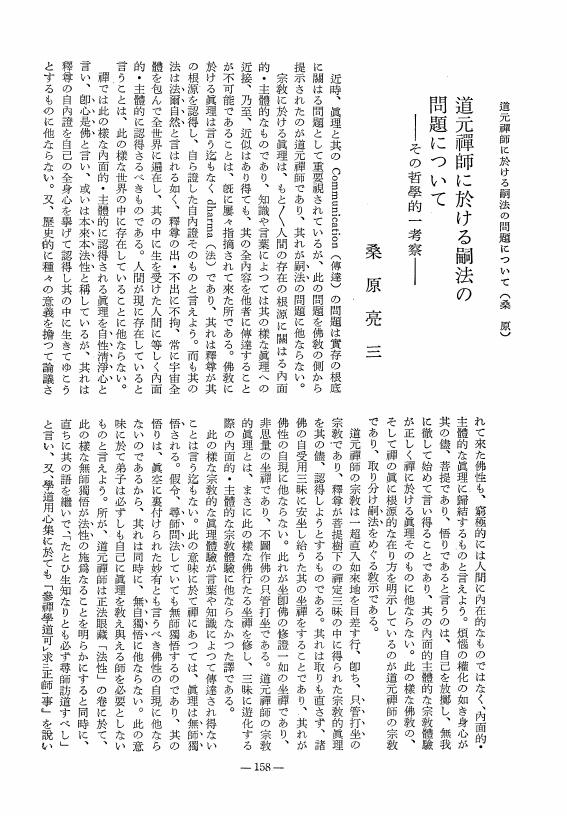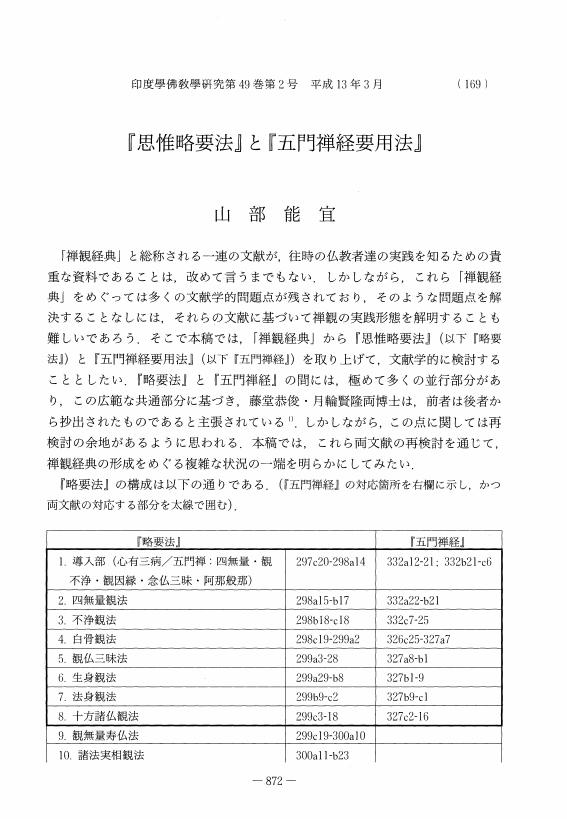1 0 0 0 OA 椎尾弁匡師と共生思想
- 著者
- 神谷 正義
- 出版者
- Japanese Association of Indian and Buddhist Studies
- 雑誌
- 印度學佛教學研究 (ISSN:00194344)
- 巻号頁・発行日
- vol.49, no.1, pp.269-273, 2000-12-20 (Released:2010-03-09)
1 0 0 0 OA 『中論』における無自性をめぐる五種の探求 (pañcadha mrgyamana)
- 著者
- 小澤 千晶
- 出版者
- Japanese Association of Indian and Buddhist Studies
- 雑誌
- 印度學佛教學研究 (ISSN:00194344)
- 巻号頁・発行日
- vol.54, no.2, pp.988-985,1337, 2006-03-20 (Released:2010-03-09)
The purpose of the Mulamadhyamakakarika is to declare nihsvabhavata. For this purpose, Nagarjuna reveals the opponents' contradictions throughvarious means, and proves nihsvabhavata. There are “five types of quest” in his argument. The “five types of quest” adds a denial of difference to the argumentation against wrong views found in Early Buddhism, and leads to the establishment of nihsvabhavata. This paper will show how the way of the argument developed to the “five types of quest” from Early Buddhism's formulation.
1 0 0 0 OA 天台口伝法門と密教
- 著者
- 大久保 良順
- 出版者
- Japanese Association of Indian and Buddhist Studies
- 雑誌
- 印度學佛教學研究 (ISSN:00194344)
- 巻号頁・発行日
- vol.18, no.1, pp.1-7, 1969-12-25 (Released:2010-03-09)
1 0 0 0 OA 一休に擬せられる仮名草子について-『一休骸骨』『一休水鏡』を中心として-
- 著者
- 飯塚 大展
- 出版者
- Japanese Association of Indian and Buddhist Studies
- 雑誌
- 印度學佛教學研究 (ISSN:00194344)
- 巻号頁・発行日
- vol.42, no.2, pp.740-744, 1994-03-25 (Released:2010-03-09)
- 参考文献数
- 5
1 0 0 0 OA 明恵上人遺訓について
- 著者
- 小泉 春明
- 出版者
- Japanese Association of Indian and Buddhist Studies
- 雑誌
- 印度學佛教學研究 (ISSN:00194344)
- 巻号頁・発行日
- vol.30, no.1, pp.179-182, 1981-12-31 (Released:2010-03-09)
1 0 0 0 OA 『天台本覚思想と神仏混合思想』
- 著者
- 中山 清田
- 出版者
- Japanese Association of Indian and Buddhist Studies
- 雑誌
- 印度學佛教學研究 (ISSN:00194344)
- 巻号頁・発行日
- vol.23, no.2, pp.865-868, 1975-03-31 (Released:2010-03-09)
1 0 0 0 OA 世親の無表業の解釈をめぐって
- 著者
- 工藤 道由
- 出版者
- Japanese Association of Indian and Buddhist Studies
- 雑誌
- 印度學佛教學研究 (ISSN:00194344)
- 巻号頁・発行日
- vol.31, no.1, pp.130-131, 1982-12-25 (Released:2010-03-09)
1 0 0 0 OA 倶舎論における無表について
- 著者
- 阿部 真也
- 出版者
- Japanese Association of Indian and Buddhist Studies
- 雑誌
- 印度學佛教學研究 (ISSN:00194344)
- 巻号頁・発行日
- vol.44, no.1, pp.35-37, 1995-12-20 (Released:2010-03-09)
1 0 0 0 OA 新薩婆多
- 著者
- 加藤 純章
- 出版者
- Japanese Association of Indian and Buddhist Studies
- 雑誌
- 印度學佛教學研究 (ISSN:00194344)
- 巻号頁・発行日
- vol.16, no.1, pp.120-121, 1967-12-25 (Released:2010-03-09)
1 0 0 0 OA 『法華経』における仏智と菩提 -方便品を中心として-
- 著者
- 苅谷 定彦
- 出版者
- Japanese Association of Indian and Buddhist Studies
- 雑誌
- 印度學佛教學研究 (ISSN:00194344)
- 巻号頁・発行日
- vol.49, no.2, pp.790-795, 2001-03-20 (Released:2010-03-09)
1 0 0 0 OA Tathagata (如來) の意義用法
- 著者
- 水野 弘元
- 出版者
- Japanese Association of Indian and Buddhist Studies
- 雑誌
- 印度學佛教學研究 (ISSN:00194344)
- 巻号頁・発行日
- vol.5, no.1, pp.41-50, 1957-01-25 (Released:2010-03-09)
- 被引用文献数
- 1
1 0 0 0 OA 漢明求法説と朱士行傳の一考察
- 著者
- 楊 鴻飛
- 出版者
- Japanese Association of Indian and Buddhist Studies
- 雑誌
- 印度學佛教學研究 (ISSN:00194344)
- 巻号頁・発行日
- vol.11, no.1, pp.146-147, 1963-01-15 (Released:2010-03-09)
1 0 0 0 OA 摩訶止観を学んだ中世の僧侶
- 著者
- 高橋 秀栄
- 出版者
- Japanese Association of Indian and Buddhist Studies
- 雑誌
- 印度學佛教學研究 (ISSN:00194344)
- 巻号頁・発行日
- vol.45, no.1, pp.122-126, 1996-12-20 (Released:2010-03-09)
1 0 0 0 OA 〈無量寿経〉における仏の〈威〉について
- 著者
- 弘中 満雄
- 出版者
- Japanese Association of Indian and Buddhist Studies
- 雑誌
- 印度學佛教學研究 (ISSN:00194344)
- 巻号頁・発行日
- vol.54, no.2, pp.1081-1077,1347, 2006-03-20 (Released:2010-03-09)
This is one consideration of the “other power” thought of Pure Land Buddhism. Concretely, the point of view is applied to the language of Buddha's supernatural power (anubhava or adhisthana) in the Sukhavativyuha, namely terminology and examples of the use of expressions referring to Amitabha Buddha's altruism. There are ten examples in all, and five of the examples are related to the power of the vow of Amitabha (or Buddhas). Although it seems that the meaning of a vow is already contained in adhisthana, from these examples we learn that the power of Amitabha to save is left to this vow's power.
1 0 0 0 OA 『地蔵十王経』考
- 著者
- 清水 邦彦
- 出版者
- Japanese Association of Indian and Buddhist Studies
- 雑誌
- 印度學佛教學研究 (ISSN:00194344)
- 巻号頁・発行日
- vol.51, no.1, pp.189-194, 2002-12-20 (Released:2010-03-09)
1 0 0 0 OA 仏教における救済と共生 -衆生の「苦」と菩薩の「悲苦」
- 著者
- 長崎 陽子
- 出版者
- Japanese Association of Indian and Buddhist Studies
- 雑誌
- 印度學佛教學研究 (ISSN:00194344)
- 巻号頁・発行日
- vol.48, no.2, pp.988-985, 2000-03-20 (Released:2010-03-09)
1 0 0 0 OA Nagarjuna's Dialectic and Indian Logic (2)
- 著者
- Shohei ICHIMURA
- 出版者
- Japanese Association of Indian and Buddhist Studies
- 雑誌
- 印度學佛教學研究 (ISSN:00194344)
- 巻号頁・発行日
- vol.46, no.2, pp.1024-1020, 1998-03-20 (Released:2010-03-09)
1 0 0 0 OA 釈尊における教化法の研究 その一
- 著者
- 皆川 広義
- 出版者
- Japanese Association of Indian and Buddhist Studies
- 雑誌
- 印度學佛教學研究 (ISSN:00194344)
- 巻号頁・発行日
- vol.21, no.2, pp.901-906, 1973-03-31 (Released:2010-03-09)
1 0 0 0 OA 道元禪師に於ける嗣法の問題について -その哲學的一考察-
- 著者
- 桑原 亮三
- 出版者
- Japanese Association of Indian and Buddhist Studies
- 雑誌
- 印度學佛教學研究 (ISSN:00194344)
- 巻号頁・発行日
- vol.10, no.1, pp.158-159, 1962-01-25 (Released:2010-03-09)
1 0 0 0 OA 『思惟略要法』と『五門禅経要用法』
- 著者
- 山部 能宜
- 出版者
- Japanese Association of Indian and Buddhist Studies
- 雑誌
- 印度學佛教學研究 (ISSN:00194344)
- 巻号頁・発行日
- vol.49, no.2, pp.872-866, 2001-03-20 (Released:2010-03-09)

















